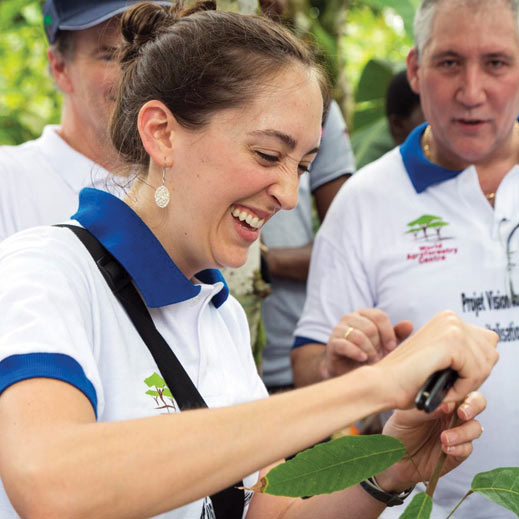Chocolate has been a favorite taste for millennia. Yet despite its popularity, the small farms that provide the world’s cocoa are having a rough time staying in business. Shayna Harris works as part of a team that is safeguarding a future for those farmers. As the cocoa sustainability manager for Mars Global Chocolate, Harris combines Sloan acumen and a personal understanding of life and agriculture in those remote plots of land. The result is a greater cocoa yield and a better life for farm families.

Growing up in Chicago, Harris volunteered with her family at food drives. At Boston University, she studied political science and international relations. A course in Latin American politics, followed by an independent study term in Mexico and an internship with Oxfam’s ethical-coffee campaign, helped her to connect those interests.
In 2008 Harris earned a Fulbright scholarship, which she used to work in small farm communities in Brazil, getting to know families and understanding the supply chain for fresh produce. Then, at Sloan, she studied corporate sustainability, government relations, entrepreneurship, and leadership. She developed and then team-taught a Sloan course on innovation in supply chains, bringing classmates to Brazil for field experience.
At the same time, Mars was trying to ensure the sustainability of the key ingredient in its confections. Cocoa is not farmed on vast tracts with modern techniques; growers live on small farms with old trees that sometimes fail to thrive. So Mars began showing the farmers techniques such as grafting. “I was really interested in the impact that we could have,” says Harris, who joined the company in 2011. “I saw some similarities to coffee and other small-holder crops.”
Besides working directly with farmers, Harris and Mars work with government extension programs and supply chain partners in Côte d’Ivoire and Indonesia to provide training and fertilizer. Harris crunches the numbers to make sure that these measures will actually boost local farmers’ incomes. “People want to provide a higher quality of life for their families,” she says.
Harris is based in her hometown of Chicago but says, “My office is in my backpack.” She is fluent in Spanish and Portuguese and is learning French. She cooks with vegetables that she grows in her rooftop garden, and she’s now training to compete in triathlons. Her husband is a biology professor at Chicago State University.
Keep Reading
Most Popular
Large language models can do jaw-dropping things. But nobody knows exactly why.
And that's a problem. Figuring it out is one of the biggest scientific puzzles of our time and a crucial step towards controlling more powerful future models.
How scientists traced a mysterious covid case back to six toilets
When wastewater surveillance turns into a hunt for a single infected individual, the ethics get tricky.
The problem with plug-in hybrids? Their drivers.
Plug-in hybrids are often sold as a transition to EVs, but new data from Europe shows we’re still underestimating the emissions they produce.
Stay connected
Get the latest updates from
MIT Technology Review
Discover special offers, top stories, upcoming events, and more.